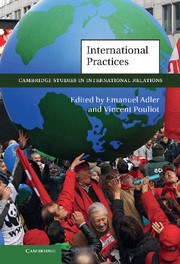Book contents
- Frontmatter
- Contents
- Figure
- Note on the contributors
- Acronyms and abbreviations
- Part I Practices in International Relations and social theory
- Part II Practices and their background
- 3 A practice theory of emotion for International Relations
- 4 Background knowledge in the foreground
- 5 Interactional international law and the practice of legality
- Part III The evolution of practices
- Part IV Practices in practice
- Part V Conclusion
- Index
- References
4 - Background knowledge in the foreground
conversations about competent practice in “sacred space”
from Part II - Practices and their background
Published online by Cambridge University Press: 05 June 2012
- Frontmatter
- Contents
- Figure
- Note on the contributors
- Acronyms and abbreviations
- Part I Practices in International Relations and social theory
- Part II Practices and their background
- 3 A practice theory of emotion for International Relations
- 4 Background knowledge in the foreground
- 5 Interactional international law and the practice of legality
- Part III The evolution of practices
- Part IV Practices in practice
- Part V Conclusion
- Index
- References
Summary
Introduction:
The modern humanitarian community, given voice by Henri Dunant, the founder of the Red Cross in 1863, constituted itself from its earliest days as a “community of practice.” This chapter examines the contemporary transformation of this community through practice, the unfolding of its life with the competency of practice at the epicenter of the change.
I treat practices, following Adler and Pouliot, as “competent performances” and “socially meaningful patterns of action.” A “community of practice is a configuration of a domain of knowledge that constitutes like-mindedness, a community of people that ‘creates the social fabric of learning,’ and a shared practice that embodies ‘the knowledge the community develops, shares, and maintains.’” In a strong statement of the understanding of practice, practice can be performed “correctly” or “incorrectly,” well or badly. Practice is competency.
- Type
- Chapter
- Information
- International Practices , pp. 87 - 107Publisher: Cambridge University PressPrint publication year: 2011
References
- 22
- Cited by

